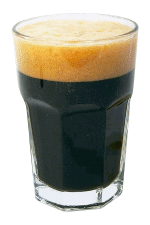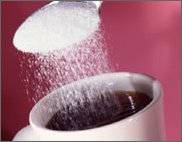Neotame: The New Artificial Sweetener More Dangerous than Aspartame?
by SixWise.com
Neotame is a relatively new artificial sweetener that has yet to become
a household name like aspartame (Nutrasweet), sucralose (Splenda) and
saccharin (Sweet 'n Low).
This high-intensity sweetener was approved by the Food and Drug Administration
(FDA) in 2002 as an artificial sweetener and flavor enhancer. It's called
high-intensity because it's considerably sweeter than other sugar substitutes
out there: depending on its use, the FDA says it's 7,000
to 13,000 times sweeter than sugar. For comparison, sucralose (Splenda)
is 600 times sweeter than sugar.
Neotame looks like white powder and has been approved for use as a tabletop
sweetener as well as for use in products like baked goods, soft drinks
and other beverages, chewing gum, confections and frostings, frozen desserts,
gelatins and puddings, jams and jellies, processed fruits and fruit juices,
yogurt-type products, candies, toppings and syrups.
|

Will diet soft drinks soon contain the new flavor-enhancing artificial
sweetener neotame?
|
The Controversy
Although the FDA says, based on their reviews of data from more than
113 animal and human studies, neotame is safe for human consumption, others
are not so sure.
According to Dr. Janet Hull, author of Sweet Poison, "Neotame contains
all the dangerous elements found in aspartame and more: the amino acids
L-aspartic acid and L-phenylalanine, plus two organic functional groups,
one known as a methyl ester group and the other as a neohexyl group ...
Neotame does not have to carry the PKU warning, as aspartame is required
by law to do, so its addition to all products can go without warning."
PKU refers to phenylketonuria (PKU), a rare metabolic disease that results
in mental retardation and other neurological problems if not caught early
on (within the first weeks of life).
If a strict diet is followed, people with this disease can develop normally
and live a normal lifespan. However, high blood levels of phenylalanine
(which makes up 50 percent of aspartame) are dangerous for those with
PKU. As such, a warning must be placed on aspartame products, but not
on neotame products. Too much dietary phenylalanine may also trigger ADD/ADHD
and emotional and behavioral disorders in otherwise healthy individuals,
according to Dr. Hull.
In a letter to the FDA, H.J. Roberts, M.D., author of Aspartame Disease:
An Ignored Epidemic, called neotame a synthetic
variation of aspartame (but, it's about 40 times more potent),
and said in his professional opinion, " ... This chemical poses
a potential major health and environmental hazard to the American public."
He goes on to say:
"In my opinion, there is already sufficient evidence for aspartame
products to be withdrawn from the market as an "imminent public
health hazard" NOW! I have documented severe neurological, intellectual,
psychiatric, metabolic, endocrine, allergic and other reactions to aspartame
products in hundreds of patients. Moreover, there is considerable reason
to invoke aspartame and its metabolites as a cause of significant contributory
factor in the aggravation of precipitation of diabetes and its complications,
multiple sclerosis, brain cancer, and the acceleration of Alzheimer's
disease."
Further, Jack Samuels of the Truth in Labeling Campaign, pointed out,
"Neotame, like aspartame, contains aspartic
acid, phenylalanine, and a methyl esther." Here is a breakdown
of the three ingredients.
-
Phenylalanine: An amino acid necessary for neurotransmitter
production. However, according to nutritionist Robert L. Pastore,
PhD, "Pregnant women, those with anxiety attacks, individuals
with high blood pressure, people with phenylketonuria and pre-existing
pigmented melanoma should avoid its supplementation."
-
Aspartic acid: Too much of this substance is "suspected
to cause brain damage in fetuses, and high doses have been found to
destroy brain cells in experimental animals," says Pastore.
-
Methanol (methyl alcohol, wood alcohol): This substance is
converted to formaldehyde and formic acid, which have a toxic effect
on the thymus gland. Formaldehyde is a known carcinogen, producing
cancer of the throat, pharynx and lung, according to Pastore.
Samuels continued:
"Neuroscientists have found, in animal studies, that aspartic
acid and glutamic acid [MSG]
load on the same receptors in the brain, cause identical brain lesions
and neuroendocrine disorders, and act in an additive fashion. People
who are sensitive to processed free glutamic acid (MSG) experience similar
reactions to aspartame, and people who are sensitive to aspartame experience
similar reactions to MSG, providing that they ingest amounts of the
substances that exceed their tolerances for MSG/aspartame. People who
currently react to MSG and/or aspartame should expect to react similarly
to neotame."
|

Artificial sweeteners like neotame are a growing market: Neotame
sales grew four-fold since April 2004.
|
Where is Neotame Found?
NutraSweet Co., neotame's maker, is working to establish a market for
neotame, touting it not only as a sweetener, but as a "flavor-enhancing"
one. And based on the 2005 Prepared Foods R&D Trends, as low-carb
diets lose popularity and reduced-calorie foods gain popularity once again,
artificial sweeteners will continue to be in high demand.
Neotame, in particular, is expected to gain market share among low-calorie
products. Said one supplier, "It [neotame] is approved as a sweetener
and flavor enhancer, and has the unique capability of taking vanilla,
mint and citrus flavors and potentiating them." Already, FoodNavigator.com
reported that sales of neotame increased four-fold since April 2004.
For those interested in limiting neotame in their diets, here's a list
of some products that already contain neotame.
- Kroger's fruit juice and certain powdered ice-teas
- Detour energy bars (certain varieties)
- Roman Meal Bread line
- Herr's pretzels
- Wrigley Chewing Gum (in Australia)
Recommended Reading
MSG:
If it's Safe, Why do They Disguise it on Labels?
The
Most Toxic Soaps and Shampoos Well Worth Avoiding
Sources
FDA
Talk Paper
Sweet
Poison Newsletter
The
Threat of Neotame
Truth
in Labeling
How Sweet
It Is: An Examination of Alternatives to Sugar
Retro
Reductions
Cost
is the Key to Neotame's Success